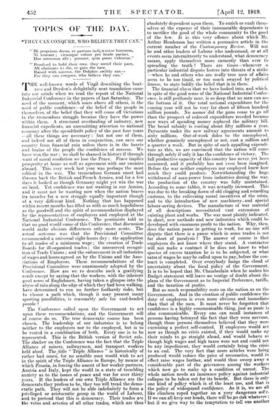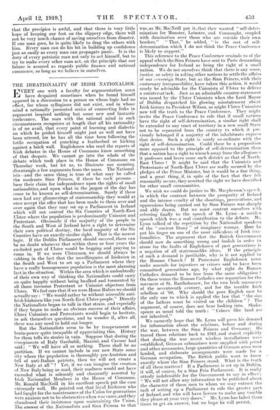TOPICS OF THE DAY.
TH EY CAN CONQUER, WHO BELIEVE THEY CAN."
" Hi proprium decus, et part= indiEnmtur honorem, Ni tenant ; vitamque volunt pro laude pacisei. Hos suceessus alit ; possunt, quia posse videntur."
" Resolved to hold their own, they mend their pace, All obstinate t3 die, or gain the race. Raised with success, the Dolphin wally ran— For they can conquer, who believe they can."
rrHE well-known words of Virgil describing the boat- 1 race and Dryden's delightfully neat translation came into our minds when we read the report of the National Industrial Conference in the papers of last Saturday. The need of the moment, which soars above all others, is the need of public confidence—of the belief of the people in themselves, of the belief that they will come off victorious in the tremendous struggle because they have the power within them. A structural overhauling of industry, new financial expedients, an unremitting attention to national economy after the spendthrift policy of the past four years —all these things are necessary ; but not one of them, and indeed not alt of them in conjunction, can save our country from financial ruin unless there is in the hearts and brains of the people the confidence of success. We have won the war ; we shall be shamed in history if through want of moral resolution we lose the Peace. Peace implies prosperity at home as well as agreement with our enemies abroad. This very week last year was perhaps the most critical in the war. The tremendous German onset had thrown back the British and French Armies, and for a few days it looked as though Germany might yet win the war on land. Yet confidence was not wanting in our Armies, and it must not be wanting now when the nation braces its musclea for a new struggle equally important though of a very different kind. Nothing that has happened within recent months has filled us with so much hopefulness as the goodwill and the spirit of accommodation displayed by the representatives of employers and employed at the National Industrial Conference. The pessimists told' us that no good would come of this Conference, that discussion would make obvious differences only more acute. The actual outcome was that the Provisional Committee recommended a universal eight-hours day ; the application to all trades of a minimum wage ; the creation of Trade Boards for ill-organized trades ; the unreserved recogni- tion of Trade Unions ; and the enforcement in all industries of wages and hours agreed on by the Unions and the Asso- ciations of Employers. These recommendations of the Provisional Committee were unanimously adopted by the Conference. How are we to describe such a gratifying result. except by saying that the workers, with the inherent good sense of Englishmen, having taken a glimpse into the abyss of ruin along the edge of which they had been walking, have determined to run no further foolhardy risks, but to choose a path which, though it may present many sporting possibilities, is reasonably safe for cool-headed people ?
The Conference called upon the Government to act upon these recommendations, and the Government will of course do so. The true democratic course has been chosen. The leadership of our industries is to belong neither to the employers nor to the employed, but is to be vested in a combination of both. Every one is to be represented. This is the British version of Soviet rule. The shadow on the Conference was the fact that the Triple Alliance of miners, railwaymen, and transport workers held aloof. The...title " Triple Alliance " is historically of rather bad omen, for no sensible man would wish to act in the spirit of the Triple Alliance in Europe, by means of which Prussia, in forcing the assent of her weaker partners, Austria and Italy, kept the world in a state of trembling anxiety as to the issues of peace and war for over thirty years. If the leaders of our own Triple Alliance are the democrats they profess to be, they too will tread the demo- cratic path. They will not be able indefinitely to form a privileged or aristocratic group in the world of Labour, and to pretend that this is democracy. Their trades aae the veins and arteries of all other trades, which are thus
absolutely dependent upon them. To enrich or exalt them- selves at the expense of their innumerable dependants is to sacrifice the good of the whole community to the good of the few. It is this very offence about which Mr. Arthur Henderson has written a persuasive article in the current number of the Contemporary Reriem. Will not he and other leaders of Labour who understand, or at all events seem intermittently to understand, what democracy means apply themselves more earnestly than ever to spreading the truth ? There are times—whenever a particular industrial dispute festers into threats of a strike —when he and others who are really true men of affairs seem to be too timid, or too much swayed by political finesse, to state boldly the belief that is in them.
The financial abyss that we have looked into, and which, in spite of the good sense of the National Industrial Confer- ence, is still perilously near, is so deep that no man can see the bottom of it. Our total national expenditure for the coming year will not be very far short of fifteen hundred million pounds. No sooner did the guns cease to go off than the prospect of reduced expenditure receded because new ways of spending money replaced the military bill. The bread subsidy is costing about fifty millions a year. Payments under the new railway agreements amount to sixty millions. Out-of-work doles to the unemployed, whether genuinely unemployed or not, cost a million and a quarter a week. But in spite of such appalling expendi- ture as this, we are convinced that the nation will come through safely if only it has the confidence of victory. The full productive capacity of this country has never yet been measured, and it probably has not even been imagined. Before the war neither employers nor employed knew how much they could produce. Notwithstanding the huge withdrawal of man-power from industries during the war, the production of the country was fully maintained. According to some tables, it was actually increased. This was due to the breaking down of old clogging and retarding customs, to the enlivening moral incentives of the crisis, and to the introduction of new machinery. and special labour-saving devices. The manufacture of war material of all descriptions necessitated vast extensions of existing plant and works. The war most plainly indicated, in short, new methods and new industries which could be developed with enormous profit to the nation. Why, then, does the nation pause in getting to work, for no one will dispute that there is a pause which in some trades is not far short of paralysis ? The answer of course is that employers do not know where they stand. A contractor will not make a contract if he does not know to what species of excess taxation he is to be subjected, or what rates of wages he may be called upon to pay, before the con- tract is completed. Over everybody hangs the cloud of uncertainty about the fiscal policy of the Government. It is to be hoped that Mr. Chamberlain when he makes his Budget statement will leave no vestige of doubt about the plans of the Government as to Imperial Preference, tariffs, and the taxation of profits. But as much responsibility rests on the nation as on the Government. And in the creation of public confidence the duty of employers is even more obvious and immediate than that of the men. It must never be forgotten that confidence is a highly communicable thing, just as panic is also communicable. Every one can recall instances of persons having betrayed the fact that they were nervous, though those persons themselves believed that they were exercising a perfect self-control. If employers would act now as though no crisis existed, if they would make up their minds to go straight ahead, and would behave as though high wages and high taxes were not and could not be any impediment, they would certainly bring the crisis to an end. The very fact that more articles were being produced would reduce the price of necessaries, would in effect raise wages further, and would thus sweep away a considerable part of the grievances among the workers which now go to make up a condition of unrest. The whole nation needs an insurance policy against industrial collapse to be taken out for its benefit. But there is only one kind of policy which is of the least use, and that is the policy of widespread confidence. As it is, we are all like climbers roped together on a very dangerous arte. If we can all keep our heads, there will be no risk whatever ; but if we give way to the temptation to tell one another that the precipice is awful, and that there is very little hope of keeping our feet on the slippery edge, there will not be very much chance of saving ourselves from disaster. If one man goes, he is quite likely to drag the others with him. Every man can do his bit in building up confidence just as easily as every man can propagate panic. It is the duty of every patriotic man not only to act himself, but to try to make every other man act, on the principle that our future is assured as regards public finance and national commerce, so long as we believe in ourselves.




































 Previous page
Previous page